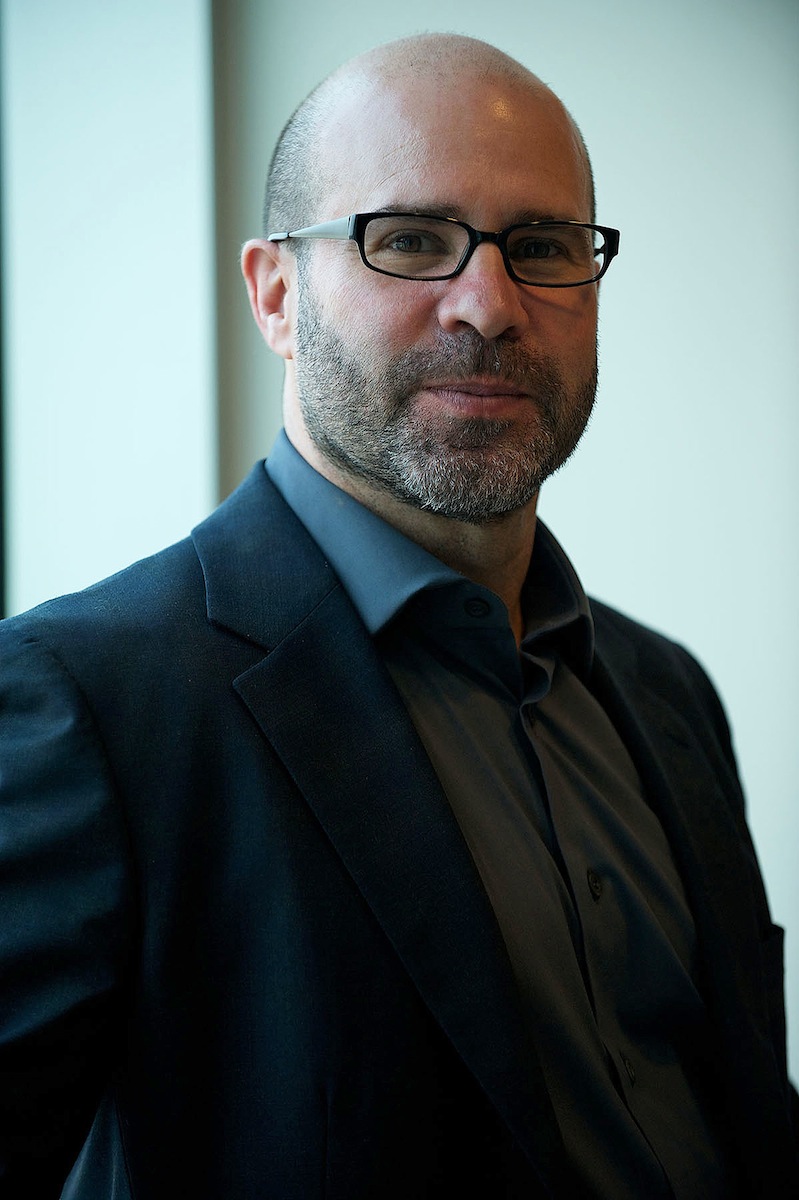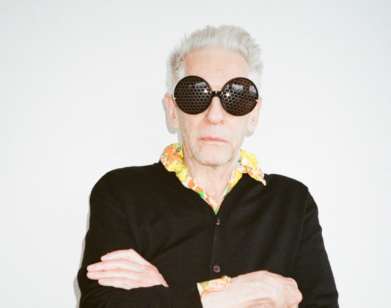Pharmed Out: Scott Z. Burns on Side Effects

ABOVE: WRITER SCOTT Z. BURNS
Having ravaged the planet with a plague-like virus in Contagion and offered a twitchy-mustached, whistleblowing Matt Damon in The Informant!, writer Scott Z. Burns and director Steven Soderbergh most recently set their sights on another target—Americans’ love affair with psychology and pharmacology.
Side Effects, starring Rooney Mara, Jude Law, Channing Tatum, and Catherine Zeta-Jones, is a slick psychological thrill ride. It screws with your head in the same way the film’s fictional, experimental drug Ablixa might do—which is, it would seem, exactly the point. The writer/director duo manipulates its audience, just as the characters in the film manipulate each other. “The movie itself is not what it appears to be, and it reflects how hard it is to know the internal state of another,” says Burns.
Always drawn to big ideas, Burns helped produce An Inconvenient Truth and wrote and directed the HBO film Pu-239 about radiation exposure at a Russian nuclear plant. All of his films are fastidiously researched—as is his next project, a non-fiction play about the 1999 Columbine massacre, which will be directed by Soderbergh in New York.
Interview caught up with Burns to talk about why sadness is not necessarily a disease and why telling ourselves stories is one way we attempt to make sense of the world.
ANGELA LEDGERWOOD: Have you always been fascinated by the psychology of people?
SCOTT Z. BURNS: Yeah. Ten years ago, or so, I spent months trailing a forensic psychiatrist at Bellevue Hospital who dealt with people whose psychiatric problems had led them into crimes. I met patients and heard about their crimes. I learned about the intersection of psychopharmacology and the law and psychiatry—there were just so many complicated stories. We are getting better at making drugs that can change people’s brains. If, as a society, we start to take more and more of these drugs for different reasons, it becomes more complicated to assess what a person’s internal state really is. Are we experiencing a slightly tweaked version of them? I wanted to find a story within that world, and I wanted to do a little mind-fucking.
LEDGERWOOD: How did your relationship with Steven Soderbergh begin?
BURNS: Steven and I first met about The Informant. I heard about the story on NPR, and I thought it was great. I knew the woman who was running his company at the time, Jennifer Fox, who put me in front of Steven, and he loved the story. When we were done shooting The Informant he looked at me and said, “Well? What else you got?” And I told him I had this idea about a pandemic drawn out of deep science. Without taking a moment he said, “I’m in.” And we have enjoyed working together ever since.
I had originally written Side Effects to direct myself. Trying to get it made was like pushing a boulder up a hill for seven or eight years and then realizing that the hill has no top and eventually you’re going to get crushed by the boulder or possibly push it forever. Or, you let somebody else do it [laughs], like Steven, and all of a sudden there is no boulder and there’s no hill.
It’s creatively incredibly gratifying working with Steven, because he has me work with the actors and he has me look at the edit and make comments. I’m on set every day, I have unfettered access to everybody in every department. If we’re shooting a scene and I’m not happy with it, I can come up to Steven and say, “When I wrote this, here’s what I was hoping. This doesn’t seem to be what we’re doing. Can we talk about it?”
LEDGERWOOD: Does Steven encourage the actors to improvise?
BURNS: With filming, you really have to stick to the script. If someone leaves a tiny detail out, it can really come back to bite you. Actors are all a little bit different. Jude [Law] is incredibly precise about his lines, in part because he comes from a theater background. Both in Contagion and in this movie, he was a joy to work with, because he’s super precise. Rooney’s character allows her to be a little less precise, because she’s a different type of actress. I love what she does in the movie. She has an amazing presence. She’s this beautiful, inscrutable person who makes you want to figure out what going on with her.
LEDGERWOOD: Do you ever feel constrained by the structure of a genre?
BURNS: I’m not trained as a screenwriter, so I have to just tell it like a story. Steven and I have similar types of radars—we want the story to accelerate in a logarithmic progression, it keeps getting faster and faster and starts to have its own rhythm.
LEDGERWOOD: How did you become a screenwriter?
BURNS: I grew up in Minnesota and went to the University of Minnesota and never took a screenwriting class. I liked writing. I’d done some fiction writing and some journalism. I didn’t know what to do after graduating, so I fell into the great safety net known as the advertising industry. I was never that comfortable in it. I felt that it was at cross-purposes with some of my political and environmental leanings, and I also wanted to tell stories in other forms. Finally, I thought, at what point in my life am I going to try to do something different? Around then Peter Berg and I met, and he was doing a TV show on ABC called Wonderland about the mental hospital at Bellevue. He said, “Why don’t you come and try this—or do you want to write 20-second commercials for the rest of your life?” And I said, “I don’t know how to write a teleplay or a screenplay,” and he said, “Yeah, you do.” [laughs] So I showed up in New York in the writer’s room on his show.
LEDGERWOOD: The movie prompts many questions about the role of drugs in our lives and the motives of the pharmaceutical giants.
BURNS: I’ve had friends and I’ve been in relationships with people who have struggled with depression or by being bipolar. Medication helps people a lot, but inevitably there are opportunities for abuse, and there’s the long-term question of, are people going to be on these drugs for the rest of their lives? When you take a step back from that and you look at the picture of society as a whole—like, how many people are taking these drugs? And are we over-prescribing as a society? And is sadness itself a disease? Because I don’t think it is. Sometimes I think sadness is a very well reasoned response to what’s going on around you. But people don’t want to be sad, because there’s so much in our culture that tells us that that’s not attractive. So they go to therapy, or they don’t even go to therapy, they go a psychiatrist, and they ask for a pill that’s going to make them less sad, and they don’t do the work of therapy that would help them understand the roots of their sadness.
On the flipside though, there are people who are living on the street who may very frequently need these medications, and we aren’t giving them drugs at all. I don’t know if we are over-prescribed as a society, we just may not be giving the drugs that we have to the right people.
LEDGERWOOD: Both in Side Effects and in your play about the Columbine shooting, you attempt to disentangle the truth from the fiction. Is this a preoccupation of yours?
BURNS: I’m really interested in this idea of hijacking a narrative, both interpersonally and within society as a whole. It’s very easy for the narrative to be co-opted for a variety of reasons, either because there’s been a tragedy and we very quickly want to manufacture a story that the media can put out there that serves as a balm for the anxiety of not knowing, or serves as a story that’s easier to sell, and it’s very hard to unwind these things once you get them going. Once it’s out there, it’s out there, and it may not be true, and that to me is fascinating—why some stories take hold, and how long they last. There’s this line from a play, something like, “Remember it is possible to get imprisoned in a linguistic contour that no longer matches the landscape of fact.” That line always stuck with me, because it’s so accurate that you all of a sudden find yourself talking about events between two people, and it’s just not what happened, but it’s become the narrative. Whether it’s a couple talking about a perceived slight, or the inability of a country to recognize an Armenian genocide or the plight of the Palestinians, or a host of other things. We get lost, and then we’re just telling stories to each other that may not have anything to do with the facts.
LEDGERWOOD: That seems to be a theme in much of your work—this digging for truth.
BURNS: Yeah. I’m fascinated about why people lie. I want to write a book about it, because as a writer, I make shit up for a living, and some amount of creative invention keeps us healthy and allows us to survive, but I really want to know where the impetus to bend reality towards our advantage comes from.
LEDGERWOOD: Deception and the secrets that we keep for ourselves and others can shape our lives.
BURNS: I always have this image of a caveman, and he’s just found a giant watering hole to the east and some other cavemen walk up to him, and they’re really thirsty and they say, “Can you tell me where the water is?” And he thinks a bit, then points to the west. [laughs] And was that the first lie that was ever told. I think the ability to deceive is a fascinating one, and it’s not uniquely human.
SIDE EFFECTS IS OUT NOW.






